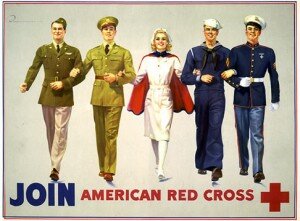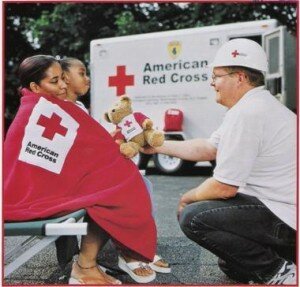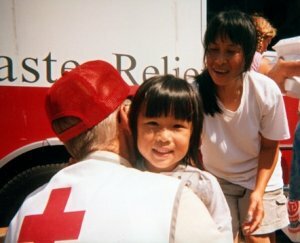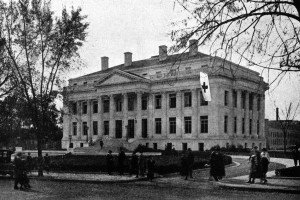 On May 21, 1881, Clara Barton and a circle of colleagues founded the American Red Cross. Barton and colleagues originally founded the Red Cross to aid injured war soldiers during the Civil War.
On May 21, 1881, Clara Barton and a circle of colleagues founded the American Red Cross. Barton and colleagues originally founded the Red Cross to aid injured war soldiers during the Civil War.
Prior to World War I, the American Red Cross developed its first water safety, first aid, and nursing initiatives. From 1914 to 1917 the number of Red Cross chapters, nation-wide, increased to 3,864 in order to aid the war effort. In 1918, Red Cross nurses helped combat the influenza epidemic.
After World War I, the American Red Cross focused their efforts on  veteran relief and safety education. The American Red Cross also expanded their services to disaster victim relief and services.
veteran relief and safety education. The American Red Cross also expanded their services to disaster victim relief and services.
Similar to World War I, the American Red Cross played a major role in World War II from supplies to providing nurses. Post World War II, the American Red Cross held the first nation-wide blood supply drive.
Since World War II, the Red Cross has expanded its services to biomedical research, human tissue collection, civil defense, CPR/AED training, HIV/AIDS education, and disaster victim support. The Red Cross also helped the federal government form the Federal Emergency Management Agency (FEMA).
Since founding the Red Crescent Societies in 1919, the American Red Cross has joined more than 175 other national societies in bringing aid to international victims of disasters.
Today we celebrate the amazing contributions the American Red Cross has given not only the United States, but also the entire world. Let us remember some of these accomplishments by reading the list below:
- The American Red Cross supplies 40 percent of the nation’s entire blood supply

- The American Red Cross supplies over 3,000 national hospitals’ blood supply
- Over 200,000 blood drive are held across the United States, annually
- During Hurricane Katrina, over 2,000 Red Cross volunteers provided relief
- The American Red Cross allocated $314.7 million in disaster relief donations to victims of the 2010 Haiti Earthquake.
- In 2001, the American Red Cross partnered with other world organization in the Measles Initiative. Since 2001, the Measles Initiative has helped vaccinate over 1 billion children in over 60 developing countries.
- Each year, the American Red Cross responds to over 70,000 disasters.
- Over 12 million Americans are trained in CPR/AED annually with the American Red Cross course.
- The American Red Cross provides one-quarter of the nation’s plasma supply through their volunteer services.
 These accomplishments would not be possible without the 131 years of American Red Cross existence. May 21 is the day to celebrate the birthday of such an amazing volunteer organization. Take a minute to thank your local Red Cross chapter for the all the work they do.
These accomplishments would not be possible without the 131 years of American Red Cross existence. May 21 is the day to celebrate the birthday of such an amazing volunteer organization. Take a minute to thank your local Red Cross chapter for the all the work they do.
Do you want to get involved with the American Red Cross? You have a great deal of volunteer options from holding a blood drive to hosting CPR training. Check out the official Red Cross site today to learn more about volunteering opportunities near you and find a local chapter close to your community.
Have you been touched by the Red Cross? We would love to hear your story in the comments section below!


 Apparently, so did a lot of other people, as suddenly I saw people in the online community running off to donate their hair to the oil spill clean-up efforts.
Apparently, so did a lot of other people, as suddenly I saw people in the online community running off to donate their hair to the oil spill clean-up efforts.

